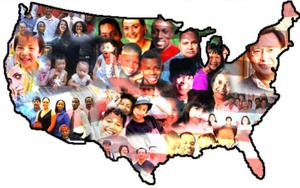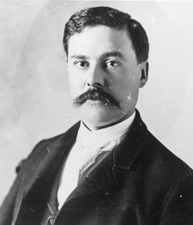Yuriy and Van lived in a much nicer neighborhood than we were used to. Most of the investigators we taught in the Little Saigon region of Orange County, California were poor immigrants who lived in either very humble homes or in apartments of varying conditions. Yuriy and Van lived in an upper middle class neighborhood with few recent immigrants.
Yet, Yuriy and Van were recent immigrants, though with a twist. Yuriy was Russian and spoke no English or Vietnamese. Van was Vietnamese but she was from the northern part of Vietnam. Most of the people we worked with were from the Saigon region of Vietnam. The northern accent presented a challenge for me, but not for my native Vietnamese companion Truyen Pham.
As we started to teach Yuriy and Van, she was very welcoming. Unable to communicate with Yuriy, he seemed annoyed by our presence. The annoyance resulted largely because of the communication barrier.
Yuriy eventually started to sit in on our lessons. We taught Van in Vietnamese and she translated into Russian for Yuriy. Yuriy was pleased when he received a copy of the Book of Mormon in Russian. It allowed him to engage directly with some content rather than just getting a snippet here and there.
Thus began one of my favorite missionary adventures. It had ups and downs including periods when we could not get a hold of them. However, something in particular set Yuriy and Van apart from the other investigators and members that we worked with…they were illegal immigrants.
The Politics and Policy of Immigration
Immigration of all sorts has led to tension within societies. Immigrants add a perceived element of competition for employment and other resources. They also challenge us culturally by bringing new foods, languages, practices, and even new religious and political outlooks. Such shifts make peoples nervous on a variety of levels and those looking to advance themselves politically (or looking to sell books) are quite apt to tap into these nervous fears.
As a moral and political philosopher, I am not looking to proscribe any particular legal reform or specific policy or program. Instead, I am interested in sharing some of the principles that I think can guide us in our debates and considerations about such policies. These principles can be found in both our scriptures and in our moral evaluations of our own experiences. However, in doing so, we may need to shed some ideological and traditional constructs.
How should we address the issue of illegal immigration? This issue has been at the focal point of many contentious debates and blog posts. Like my issues, our greatest challenge is seeing those who we are discussing as humans, humans just like us. When "law and order" (or any other abstraction) becomes more important to us than people, we have become something very ugly.
Brought By The Hand Of The Lord
5. But, said he, notwithstanding our afflictions, we have obtained a land of promise, a land which is choice above all other lands; a land which the Lord God hath covenanted with me should be a land for the inheritance of my seed. Yea, the Lord hath covenanted this land unto me, and to my children forever, and also all those who should be led out of other countries by the hand of the Lord.
6. Wherefore, I, Lehi, prophesy according to the workings of the Spirit which is in me, that there shall none come into this land save they shall be brought by the hand of the Lord.
7. Wherefore, this land is consecrated unto him whom he shall bring. And if it so be that they shall serve him according to the commandments which he hath given, it shall be a land of liberty unto them; wherefore, they shall never be brought down into captivity; if so, it shall be because of iniquity; for if iniquity shall abound cursed shall be the land for their sakes, but unto the righteous it shall be blessed forever. (2 Nephi 1: 5-7)
The land of promise which Lehi spoke of in the Book of Mormon seemed an apt description of the Vietnamese immigration population in Orange County. Some of the older members had worked in the American Embassy in Saigon before the United States withdrew from Vietnam. Others had come to United States after escaping by raft in 1980. Most of the people I met on a daily basis where the families of South Vietnamese soldiers who had been imprisoned for up to a decade in education camps following the fall of Saigon to the North Vietnamese in 1975.
Surely, if “none come into this land save they shall be brought by the hand of the Lord,” these people had been brought to this land of freedom and opportunity from the authoritarian homeland which the had fled. At least that is how it seemed to me as a bright-eyed nineteen year old. I no longer think that all human events are part of God’s meta-chess game. Yet, who I am I to judge one way or another the motivations of another in coming the United States.
The idea of immigrants coming to the New World in order to realize the American Dream is one which can be traced back to the Pilgrims at Plymouth Rock. It is also an integral part of Mormon pioneer narrative as newly baptized European Saints bolstered up the community of Saints in the young frontier of Deseret.
Van and Yuriy’s story had a different background. Van was the daughter of a well-off North Vietnamese family, likely with close ties to the Communist establishment. From a young age she had been intensely trained as a classical pianist. In order to get the best training, she was sent to a boarding school in Moscow. There she would meet Yuriy.
Yuriy was a bit older than Van. He had previously been married and had older children. He once told Elder Pham and I, that his older children reminded him of the rebellious Laman and Lemuel characters from The Book of Mormon, because they did not come unto the Lord as their father had wished.
When we where teaching them, I was not aware of the circumstances of their migration to California. It was not something we gave much thought to since the United States had a rather friendly immigration policy toward individuals and families leaving Vietnam. As we often joked, their were few Vietnamese illegal immigrants in California…the swim was too long. Additionally, United States immigration law was friendly towards permanent and long-term relocation of Vietnamese immigrants to the United States. As a result, fewer Vietnamese immigrants ended up being in the position of having a lapsed temporary or work visa (many undocumented residents come to the United States with a visa and become “undocumented” when the term of their stay lapses).
Tribes, Nations, and Division
2. And the people were divided one against another; and they did separate one from another into tribes, every man according to his family and his kindred and friends; and thus they did destroy the government of the land. (3 Nephi 7:2)
The above verse from 3 Nephi Chapter 7 begins an account of the evils and secret combinations that befell the Nephites and Lamanites prior Christ’s visit to the Americas. This division amongst them would lead to great wickedness and pride. Centuries later a secular prophet, Jean-Jacque Rousseau, would lament the way in which property lines, and eventually national borders, pitted man against man and destroyed the brotherhood of man. The tribal lines adopted by the Nephites and Lamanites caused them to lose sight of the secret combinations which they had once stood united against. Instead, these combinations grew in power and influence.
Such divisions where very much present amongst Mormons in Orange County. The cities of Garden Grove, Westminster, and Santa Ana had once been bastions of white middle-class living. An influx of Mexican, Korean, Cambodian, and Vietnamese immigrant communities was followed by the “white flight” as middle-class whites moved to other parts of California, as well as to places such as Arizona and Nevada. LDS congregations in particular faced considerable changes as ethnic language branches, wards, and stakes grew, while once strong English-speaking congregations were merged, folded, and dissolved.
While illegal immigration was typically not an issue amongst the Asian immigrant populations of Orange County, it was something that the Spanish-speaking units dealt with on a regular basis.
“The Sunday School President didn’t show up today, turns out he was deported,” a Spanish-speaking missionary casually mentioned to another missionary in the hallway of the Garden Grove Stake Center.
“What will happen to him?” I asked.
“Oh, he will be back next week,” responded the other missionary as though this was rather routine.
It was while talking with other missionaries in the mid-1990s that I learned that the Church paid little attention to immigration status when making callings and when considering new members for baptism.
I once asked a Spanish-speaking missionary if they ever baptized “illegal immigrants.” He paused. With a perplexed look he asked me, “Who do you think we baptize?”
He continued to say that 85 to 90 percent of the Spanish-speaking wards were undocumented. I was briefly surprised, but it also lead to a change in paradigm. I had watched these Hispanic Latter-day Saints with awe my entire mission. Their congregations were strong and the members were enthusiastic. These were good people. Maybe their immigration status did not matter.
The indifference of the Church when it comes to the legal status of it’s members and converts has drawn the ire of anti-illegal immigration forces. In particular, Lou Dobbs, formerly of CNN, attacked the Church for only caring about filling the pews. In some sense this is accurate…the LDS Church is more interested in which Church attend than we are in you nationality or residence status.
The question of how we should treat undocumented residents or illegal immigrants is not a special category. Instead, it is a question of how should we treat other people. Christianity deals with many things, but it contains a special emphasis on how we should treat our fellow man.
The Book of Mormon has many passages about this aspect of Christianity and two came to mind as I ponder this issue.
We learn in the first chapter of Alma about how the Nephites treated each other during a time of collective righteousness.
30. And thus, in their prosperous circumstances, they did not send away any who were naked, or that were hungry, or that were athirst, or that were sick, or that had not been nourished; and they did not set their hearts upon riches; therefore they were liberal to all, both old and young, both bond and free, both male and female, whether out of the church or in the church, having no respect to persons as to those who stood in need. (Alma 1:30)
If we act according to this attitude, I do not see how we could deny assistance to those athirst in the dessert or provide health care to the needy, even if they are undocumented. Surely this is the spirit of “having no respect to persons as to those who stood in need.”
Yet, I do not think that having pity, or even charity, for the needy goes far enough. For this I turn to Jacob Chapter 2.
17. Think of your brethren like unto yourselves, and be familiar with all and free with your substance, that they may be rich like unto you. (Jacob 2:17)
While I have dealt with the second part of the verse in some of my other work, it is the first part of this verse that is key to how we should view and treat other people. We should think of others as being like ourselves. They worry about their family, just like I do. They have hopes and dreams, just like I do. The are struggling to make it is a tough world, just like I am. The undocumented immigrant is not all that different that me. She is a human being. She is a daughter of God.
I am of great worth. So is she.
Are we living the faith?
Now, I am not looking to propose any law or policy that will solve or even address this issue.

However, if we are living up to the ideals of our scripture, Christians should be viewing and treating immigrants in a certain way. We cannot know the intent of the heart of others, but out words are often an indicator of our hearts. No matter our view of policy and law, how do we speak of immigrants when around others. How do we respond to the comments of others when they speak of our brethren with hate or wrath.
Jesus Christ set forth a great example to us. At Jacobs Well, Jesus did not care that the woman was a Samaritan. His focus was on his eternal work and not worldly divisions. To say that this is silly and unrealistic in our world, is a response rooted in the pride of the world.
Van and Yuriy were eventually baptized. Yuriy came to church and read from his Russian Book of Mormon. While serving in a different area, I learned that they had moved from the house where we had taught them. They had moved to an apartment and they were having trouble.
Turns out that they had come to the United States on short-term visas and had stayed longer than they were allowed. They were in the country illegally. This is not an uncommon story. Many illegal residents, crossed the border legally. However, they decided to stay after coming here.
For Yuriy and Van, I had no doubt that they had been brought here by the hand of the Lord, as Lehi had said.
Looking back, I was not phased at all by their legal status, though I likely would have been prior to my mission. Yuriy was now my brother. Van was now my sister.












